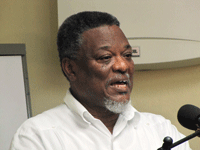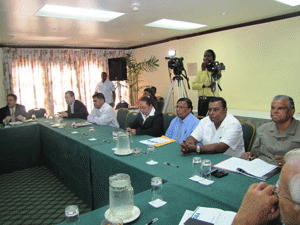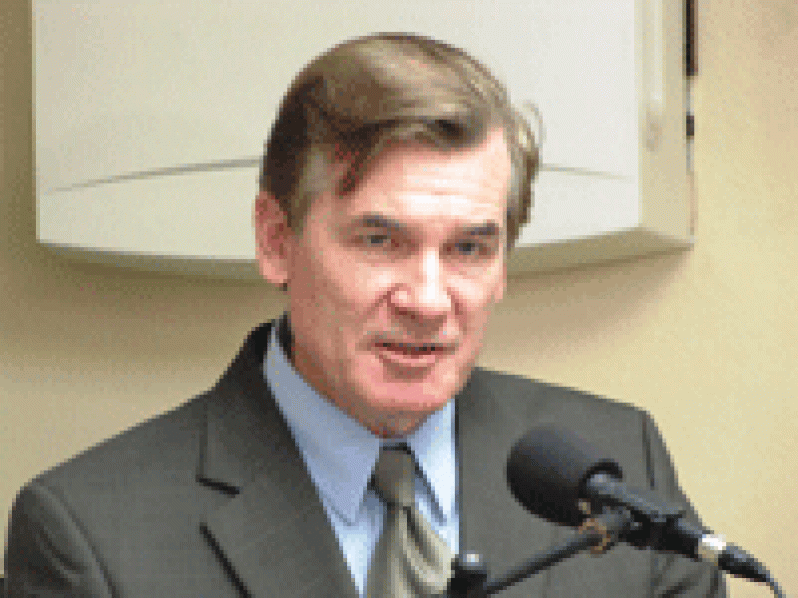– Hinterland health facilities to benefit
GUYANA, as it continues its endeavours to provide sustainable renewable energy sources has recognised the need to address the limitations it may have in providing such energy by seeking partnerships with key stakeholders.  As a result of one such partnership between the United States Agency for International Development(USAID) in collaboration with Arizona State University and, the Guyana Energy Agency (GEA), a Clean Energy Policy Workshop titled ‘Sustainable PV investments in the Developing World’ was held on Wednesday at Cara Lodge, Quamina Street, Georgetown.
As a result of one such partnership between the United States Agency for International Development(USAID) in collaboration with Arizona State University and, the Guyana Energy Agency (GEA), a Clean Energy Policy Workshop titled ‘Sustainable PV investments in the Developing World’ was held on Wednesday at Cara Lodge, Quamina Street, Georgetown.
The workshop is designed to discuss Guyana’s renewable energy infrastructure with a particular focus on long-term technical, financial, institutional and socio-economic sustainability of solar Photo Voltaic (PV) technologies, in particular, for health facilities in rural ‘off the grid areas’.
United States Ambassador to Guyana Brent Hardt said Guyana is blessed with abundant renewable energy resources which affords it an array of opportunities to explore alternative forms of energy production.
“Its Low Carbon Development Strategy advocates renewable energy as a key energy source, to this end, government has been promoting the dissemination of solar panels throughout the interior,” Ambassador Hardt said.
The US diplomat said that USAID has partnered with the Ministry of Health and other local associates in the development of many health facilities across the country, which play a critical role in supporting HIV/AIDS care and prevention activities. As such, they require stable, high-quality power for the operation of sensitive laboratory equipment and the maintenance of critical refrigeration needs.
The acquisition of reliable and affordable power poses a challenge to many health facilities, especially in remote rural areas. “To address this challenge, USAID has created a new initiative – the Improving Health Facility Infrastructure project- aimed at expanding solar energy services for health facilities in Guyana… a major component of this initiative is the Vocational Training and Education for Clean Energy (VOCTEC) activity, implemented under the leadership of Arizona State University,” Ambassador Hardt said.
“To address this challenge, USAID has created a new initiative – the Improving Health Facility Infrastructure project- aimed at expanding solar energy services for health facilities in Guyana… a major component of this initiative is the Vocational Training and Education for Clean Energy (VOCTEC) activity, implemented under the leadership of Arizona State University,” Ambassador Hardt said.
He added that this programme aims to boost the use of solar energy infrastructure and investments by increasing awareness, knowledge and capacity of local stakeholders, primarily for decentralized clean (solar) energy technologies.
“As evidenced by (Wednesday’s) event, VOCTEC will seek to provide technical training to local counterparts related to the design, installation, operation, and maintenance of solar energy systems…fundamental to this programme is the concept that integration of solar energy infrastructure into any community is rooted in social acceptability and economic feasibility,” Ambassador Hardt said.
Prime Minister Samuel Hinds who holds responsibility for Energy said that in the Hinterland areas where homes are some distance away from the electricity grid, the price for the supply of electricity is costly. As such, government in its efforts to provide electricity to such homes came up with the solar home systems as it was the most cost effective alternative.
The Hinterland Electrification Programme entails the procurement of 11,000 home systems for 184 villages, which will provide power for lighting, and operation of small household appliances such as sewing machines and radios.
Several thousands of the 65-watt panels have already been dispatched to Region Nine villages.
This programme complements the US $28.2M Unserved Areas Electrification Programme (UAEP), which saw 1,750 hinterland homes being illuminated via solar power during 2002 to 2010.
“As we look towards satisfying the needs of electricity to our peoples we look for what is adequate taking the development thrust in this regard in stages, thereby making improvements over the years…this workshop will give us the opportunity to provide quality services to our people in the hinterland areas,” Prime Minister Hinds said.
Delia Saenz, Vice Provost for International Education and Institutional Inclusion of the Arizona State University said that the University’s work in collaboration with USIAD, aims to reduce failure in sustainability.
“We are well aware that PV systems, particularly in rural areas can prematurely become inoperative after only 3-5 years, even though the life cycle capacity can reach 20 years…our task then is to enable reliable, cost-effective operation of PV systems over their design lifetime,” Saenz said.
The Guyana Clean Energy Workshop brings together an array of leading experts and practitioners to assist and facilitate the engagement of Guyana’s public and private sectors in sustainable solar technologies.
USAID clean energy project to assist with solar energy services
SHARE THIS ARTICLE :
Facebook
Twitter
WhatsApp



.jpg)








